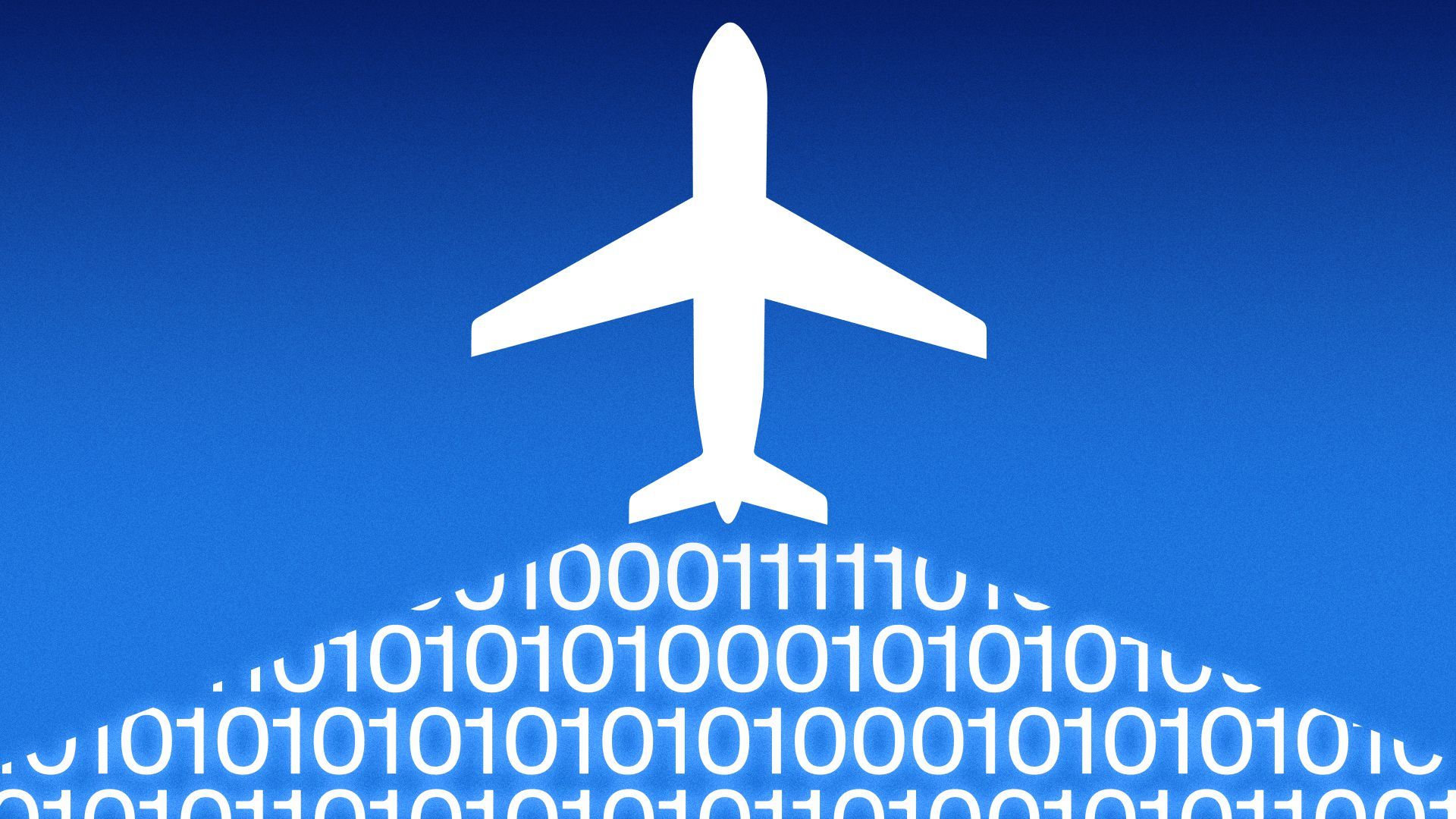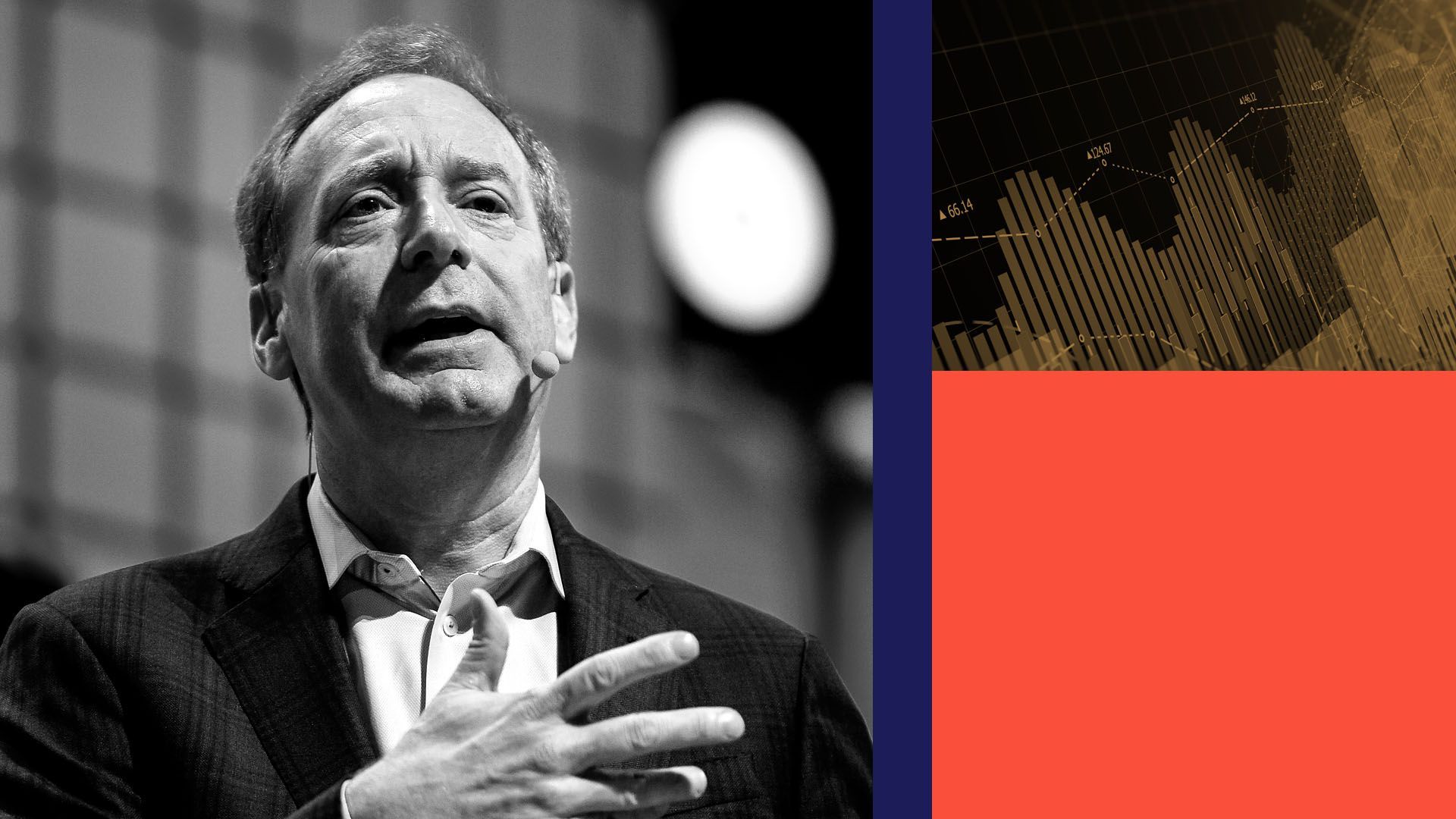| | | | | | | Presented By AlixPartners | | | | Axios What's Next | | By Alex Fitzpatrick, Jennifer A. Kingson and Joann Muller · Feb 03, 2023 | | Autonomous commercial flight could arrive sooner than you think — but plenty of challenges remain, Alex reports today. Today's newsletter is 1,030 words ... 4 minutes. | | | | | | 1 big thing: Look ma, no pilot |  | | | Illustration: Shoshana Gordon/Axios | | | | The world's biggest commercial aircraft makers seem increasingly convinced that autonomous passenger flight is a question of when, not if, Alex Fitzpatrick reports. Where it stands: Flying today's high-tech passenger jets is often a matter of setting up and overseeing their autopilot and other automated systems — but we're not yet at a point where computer systems can entirely replace human pilots. Driving the news: "Autonomy is going to come to all of the airplanes eventually," Boeing CEO Dave Calhoun told Bloomberg TV at an event this week marking the delivery of the last commercial 747. - "The future of autonomy is real" for civil aviation, he added.
- Boeing rival Airbus, meanwhile, has been testing a suite of advanced autonomous flight systems it's calling DragonFly.
Details: DragonFly is designed to enable automatic landings in bad weather, handle in-flight emergencies (like an incapacitated human pilot), and ease pilots' workload while taxiing around complicated airports. Meanwhile: A California startup called Xwing — shoutout to Star Wars fans everywhere — is working on gate-to-gate autonomous cargo flights using modified Cessna Grand Caravans remotely overseen by staffers on the ground. - Xwing recently landed a contract to work alongside the Federal Aviation Administration (FAA), NASA and others to research how to best integrate autonomous aircraft into complex airspace.
- A similar startup, Natilus, just inked a deal to sell 20 remote-controlled cargo planes to Ameriflight, which flies packages for UPS, FedEx and others.
The intrigue: Nobody's suggesting human pilots will entirely disappear from passenger aircraft flight decks anytime soon. - Instead, the idea is that increased automation could lead the FAA to relax a rule requiring two pilots for many commercial flights.
- But pilots are pushing back against even that — in part over safety fears, and in part because of the potential risk to their livelihoods.
- "A minimum two-person flight crew is necessary to manage the flight deck workload and protect against the potential incapacitation of one pilot," reads an info page from the Air Line Pilots Association, International, a pilot union.
Yes, but: Airlines love anything that saves them money — and having to pay one fewer pilot for every flight would do exactly that. - Meanwhile, others predict that the rise of autonomous flight technology will create all manner of new jobs to support such systems, as Joann has reported.
What's next: As Xwing's and Natilus' progress shows, it's likely that the next generation of autonomous systems will first prove their mettle in cargo operations before coming to passenger aircraft. The bottom line: Solving the technological hurdles of autonomous flight is one thing. Convincing people to fly aboard an aircraft with one or no human pilots is an entirely different matter. Share this story. |     | | | | | | 2. Microsoft prez calls for AI dialogue |  | | | Photo Illustration: Sarah Grillo/Axios. Photo: Cody Glenn/Sportsfile for Web Summit via Getty Images | | | | The latest AI technologies require guardrails that can't be established by tech companies alone, Microsoft President Brad Smith said Thursday, Axios' Ina Fried reports. - In a blog post, Smith called for greater dialogue with governments and other stakeholders, but stopped short of calling for specific regulation.
Why it matters: Few laws today govern how businesses or governments can use AI, though European lawmakers have begun discussions on a wide-ranging AI Act. State of play: Microsoft, like other tech companies, has its own process for vetting the ethics of various AI projects. - But "our own efforts and those of other like-minded organizations won't be enough," Smith said.
- "This transformative moment for AI calls for a wider lens on the impacts of the technology ... and a much broader dialog among stakeholders."
Read the rest. |     | | | | | | 3. Citrus crisis strikes Florida |  | | | A crop of oranges. Photo: Joe Raedle/Getty Images | | | | Florida orange growers are facing what's forecast to be their smallest crop in nearly 90 years, Axios' Deirdra Funcheon reports. What's happening: Florida is expected to produce 18 million 90-pound boxes of juicing oranges this year, according to a U.S. Department of Agriculture forecast. Why it matters: The existing short supply of Florida oranges is already driving orange juice prices up. - Not-from-concentrate juice now costs more than $10 a gallon, up roughly 20% from 2016, per the Journal.
Between the lines: Matt Joyner, CEO of trade association Florida Citrus Mutual, told Axios that farmers had just started to recover from 2017's Hurricane Irma when 2022 brought a series of severe weather events. Read the rest. |     | | | | | | A message from AlixPartners | | Today's business environment is tougher than ever | | |  | | | | The pandemic forced business leaders to face the inevitability of disruption — but that was just a dress rehearsal. What you need to know: 98% of companies are changing their business models to adapt to supply chain issues, inflation and more. Get the AlixPartners Disruption Index report. | | | | | | 4. CEOs go radio silent on America's tragedies |  | | | Illustration: Tiffany Herring/Axios | | | | Companies that were once vocal on human rights and societal issues have held statements close to the vest or stayed silent following the recent streak of American tragedies, Axios' Eleanor Hawkins writes. Why it matters: This is a major shift in the way leaders communicate during heightened moments of tragedy and crisis. State of play: In 2020, after the murder of George Floyd, executives from Dell Technologies, Merck and Ford made statements slamming police brutality. - However, when asked how their leaders were responding to the recent fatal police beating of Tyre Nichols, reps from all three companies declined to comment.
The big picture: The Business Roundtable, a coalition of CEOs from America's top companies, previously pushed for comprehensive police reform. - "Corporate America cannot sit this one out," the group said in 2020.
What they're saying now: "We are disturbed by the brutality Mr. Nichols suffered and express our condolences to his family and community, and communities across the country grappling with senseless violence," a Business Roundtable spokesperson told Axios. Between the lines: There's been no public call to action, plan to reignite reform or funding commitments. - Experts point to a few reasons for the shift, including changing power dynamics, economic uncertainty, ESG pushback and fatigue.
Read the rest. |     | | | | | | 5. 🌩️ Lightning round |  Data: Chris Vagasky/Vaisala, National Lightning Safety Council; Map: Erin Davis/Axios Visuals 2022 was a relatively average year for the total number of lightning strikes across the U.S., Axios' Andrew Freedman writes — yet the pattern of strikes was unusual. - That's based on data from environmental measurement firm Vaisala, mapped above.
Between the lines: Florida took the top prize for the most lightning flashes last year, while the Southeast overall saw quite a bit of activity. The big picture: In a warming world, the total amount of lightning is expected to increase. - That's because a hotter, more humid atmosphere increases instability, leading to more frequent thunderstorms.
|     | | | | | | A message from AlixPartners | | 98% of executives say their business models must change | | |  | | | | The 4th annual AlixPartners Disruption Index surveyed 3K CEOs and senior executives to learn how shifts in the global economy disrupt their companies. Here's why: Disruption has 75% of CEOs anxious that their company isn't adapting fast enough, while 85% don't know where to start. Read the report. | | | | Big thanks to What's Next copy editor Amy Stern. Was this email forwarded to you? Get your daily dose of What's Next by signing up here for our free newsletter. |  | | Are you a fan of this email format? Your essential communications — to staff, clients and other stakeholders — can have the same style. Axios HQ, a powerful platform, will help you do it. | | | | | | Axios thanks our partners for supporting our newsletters.
Sponsorship has no influence on editorial content. Axios, 3100 Clarendon Blvd, Arlington VA 22201 | | | You received this email because you signed up for newsletters from Axios.
To stop receiving this newsletter, unsubscribe or manage your email preferences. | | | Was this email forwarded to you?
Sign up now to get Axios in your inbox. | | | | Follow Axios on social media:    | | | | | |










No comments:
Post a Comment